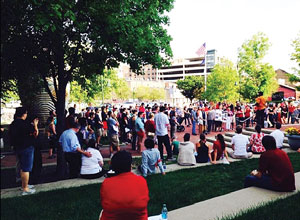 Prophetically reimagining the church
Prophetically reimagining the church
Moments of survival and resistance
A vigil for Michael Brown brings a young woman home to the church.
by Mihee Kim-Kort
We met for coffee one afternoon.
Taylor Beck was a slight girl with wide eyes who furrowed her brows at everything I said during our conversation. She had grown up in a nearby town and studied at a community college before coming to the university where I work as a college minister. Her nontraditional path lent Beck a look of determination that suggested she would make the most of her short time here. After hearing about her art history major and keen interest in women’s studies, I asked what had brought her recently to a Presbyterian church.
Shortly after Beck had moved to Bloomington, Indiana, 18-year-old Michael Brown was shot dead by police officer Darren Wilson on a street in Ferguson, Missouri. Feeling a profound unrest, she looked for a vigil nearby to join with others in mourning this loss.

Indiana University Bloomington students, staff, and community members come together for a vigil for Michael Brown.
It just so happened that a couple of church folks—my husband (Andy) and I—had organized a vigil in conjunction with National Moment of Silence, or #nmos14 on Twitter.
Seeing two Presbyterian ministers leading this community vigil piqued Beck’s curiosity. She had spent much of her childhood in a nondenominational church but had never felt quite at home there, like something was missing. Then she visited First Presbyterian, where Andy serves, and discovered a place where the work of compassion and justice goes on daily. And it was the work of the whole community, not just the clergy.
“That is what drew me to the church,” Beck says. “I don’t want to go to church to feel good about myself or to get warm, fuzzy feelings but to be challenged and made uncomfortable. I believe this church will do that for me.”
And she had come because of the vigil. Hearing this solidified what I had been pondering lately—that being clergy also means being community organizer, activist, and revolutionary.
As a pastor, I am called to cultivate spaces where people can experience firsthand the struggle for justice and healing—not as an abstraction or a project for other people, but as work in which we all have a stake. It must be personal, this daily surviving and saving and being saved. Sometimes these moments are dramatic, and sometimes they’re quiet—the gentle touch during a prayer, the passing of the peace or the cup. Sometimes it’s complicated, and sometimes it’s as simple as softly singing, “Lord have mercy upon on us, Christ have mercy upon us, Lord have mercy upon us.” These are moments of salvation. These are moments of survival and resistance.
I write this on the night of the grand-jury decision not to indict Darren Wilson. It is three days after Akai Gurley was shot dead in a dark stairwell by a New York City police officer. It is two days after Tamir Rice, a 12-year-old black boy, was shot and killed by a police officer in Ohio. It is the day that Marissa Alexander took a plea deal that will allow her to go free in 65 days, but as a convicted felon, for firing a warning shot in self-defense.
I write all this out purposefully, as a killjoy and prophet, as an aspiring leader of this resistance, to name what we need to call out, examine, and address as the church.
Because that’s what we do—we resist. It’s in the blood and marrow of the Protestant church. Our Scriptures are rooted in protest and uprisings, and when we tell these stories we resist despair. In gathering together around Word and words, sacrament and song, in prayer and pause, we resist darkness. As we break bread and share the cup, a seemingly absurd meal that insists absolute love and the promise of a new world are real, we resist death and proclaim hope.
We proclaim the saving death and life of the risen Lord until he comes again.
Mihee Kim-Kort is an ordained Presbyterian pastor and UKirk college minister at Indiana University in Bloomington.


